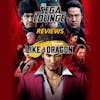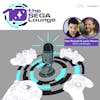
BONUS: Yakuza: Like a Dragon Review

Listen to KC's thoughts on Yakuza: Like a Dragon, the latest entry in the popular Ryu Ga Gotoku Studio series in this long overdue review of the game.

Welcome to my long overdue review of Yakuza 7 or Like a Dragon, as it's known in the West. I say review but it's more of an exposition of my thoughts on the game after having spent so much time with it in the last few weeks. This comes from a person who is not into JRPGs all that much. I've mentioned this several times before, but it was never a genre I got into as a kid and I've always struggled with keeping myself interested in pure turn-based JRPGs. I'm more of an action RPG type of person and the shift from the usual brawler type kind of gameplay from previous entries in the Yakuza series to a turn-based battle system had me worried, if I'm being completely honest.
This review will focus on the story, the gameplay and the presentation. It's going to be a long one, so sit back, grab a drink and let us dive into the world of Yakuza: Like a Dragon, now available for Xbox and PlayStation consoles, as well as PC, Mac and Linux.
STORY
Many fans of the Yakuza series will tell you that its strongest point has always been the story. Through convoluted plots and plot twists, as well as cutscenes and sub-stories that make you feel a connection with its diverse cast, Ryu Ga Gotoku Studio has always been able to bring the world of Yakuza to life in a singular way. So much so that the idea of not having Kazuma Kiryu as the protagonist of the most recent main game in the series made me feel a bit sad, if I'm being honest.
This time we are introduced to a low-ranking Tojo Clan officer of the Arakawa Family called Ichiban Kasuga as our main protagonist. Long story short, Ichiban takes the fall for his family's captain who allegedly killed a man from a different clan and goes to prison. When he finally gets out, 17 years later, Kamurocho is a totally different place, the Tojo Clan is no more and the man he admired so much, his patriarch, shoots him. From then on, the story moves to Ijincho, in Yokohama, and that's where you really get to know Ichiban and his party of misfits. You can expect the usual plot twists and turns along the way and you really do feel a connection with the lovable Ichi. Maybe a stronger connection than you ever got with Kiryu. The new main character is not a legendary yakuza - far from it, really. He is an optimistic guy who grew up playing Dragon Quest and is determined to make a better life for himself and his friends, or as he puts it, leveling up. The same goes for the diverse roster of party members you meet along the way who you can increase your bond with mostly by sharing a drink at your favorite watering hole, Survive Bar.
But as much as RGG Studio is clearly trying to start fresh with a new protagonist and set of supporting characters as well as a new main location, I was delighted to see how they also managed to successfully have a changing of the guard that brings some continuity to long time fans of the series. That is seen in the Tojo Clan origins of Ichiban Kasuga, in the fact that you get to walk around Kamurocho and Sotenbori at different points in the game, but especially through the story itself, which I won't spoil for obvious reasons. But I will say it felt very satisfying and made me really happy, like a passing of the baton, so to speak.
Yakuza's storylines have always been more than just a crime drama. I think there's always been a social message underneath it all. More than what society thinks of a person it's their character that matters the most, with qualities like honor, justice and compassion being what made Kiryu a strong character and the perfect protagonist. This time, though, Like a Dragon's story highlights social and even economic inequalities more than ever before, showing you can hit rock bottom from society's point of view, but still get back up and remain optimistic and inspire others. People who are often marginalized by society sometimes prove to have more honor and compassion than the corrupt elites who often contribute to create an even bigger divide between the rich and the poor, the privileged and the underprivileged, when they should be helping to bridge the gap. But make no mistake, the game takes you from a serious moment to a wacky scene in a heartbeat and that's what sometimes gets you hooked. It addresses serious issues while not taking itself seriously.
In short, Yakuza: Like a Dragon succeeds in bringing an interesting and engaging story to the table. One I was constantly being surprised by and thrilled with.
GAMEPLAY
When it comes to gameplay, gone is the usual brawler type action we've come to know and love. You now have a party of friends that join you in turn-based battles. As much as I'm not a fan of this in most JRPGs, I really enjoyed Yakuza: Like a Dragon's turn-based battles. Maybe it's the music, the setting of these fights, the absolute insane moves and enemy types you encounter, or just how seamlessly you move from exploring to fighting with no loading times whatsoever, at least on my Xbox One X.
As in any proper JRPG, you can assign different jobs to your party members which will in turn unlock different fighting styles and special skills. The jobs are pretty much Yakuza madness, ranging from a host or hostess to a pop idol, a breakdancer, a musician or a cook, to name just a few. Of course, skills will cost you magic points and will have different status effects on enemies. Again, I'm usually more of a mash buttons and kick ass kind of guy, but the battle system isn't overly complicated and as I progressed through the game I came to understand the advantage of knowing how it worked and having different characters in my party at different times. Some of the later battles in the game will require you to make good use of characters who have healing skills, for example, and you'll have to sometimes sacrifice your attack for a good defense.
Having said that, later chapters in the game will also remind you that this is indeed a JRPG, which requires some grinding. I think halfway through the game I reached a point where I realized I had to level up my characters before I could move any further. So off to the streets of Ijincho I went and then to the sewers and then to the arena in Sotenbori. Sadly, it takes a while to feel the effects of the grind, but it's really not that bad when compared to other RPGs I've tried in the past. Again, maybe because of the sheer variety of enemies, or Sujimon, you encounter.
Yes, Like a Dragon turns finding and defeating enemies on the streets into a Pokémon like experience where you have to find all the Sujimon so you can fill up your Sujidex. Crazy stuff, I know, but you wouldn't expect anything else from this series, would you? And this also makes sense when you remember Ichiban looks at life as a video game and his imagination transforms the people he fights into crazy enemies such as the Twitchy Streamer, the Weltraiser or the Emperor of Funk.
Like a Dragon allows you to activate auto-battle mode at any point during a fight, which is basically a customizable auto-pilot mode for battles. To be honest, I used it a lot until halfway through the game until I realized I preferred to have full control of what my party was doing. But it's there for those who want it. And so are ahem the poundmates. I'll explain: as you progress through the story and especially as you complete sub-stories, you'll unlock characters you can summon during a battle using your smartphone. Each of them has a different ability, which could be an attack, a status removal, etc., and they're all free-to-use for the first time but require a certain fee to be paid for subsequent uses. These characters range from a huge yakuza dressed like a baby to Nancy-chan, a crawfish... of course.
You can also buy increasingly powerful weapons at certain locations as well as upgrading the ones you own to better prepare your party for battle on the streets or in several indoor venues the game calls dungeons, in typical RPG fashion.
All of this makes for a very enjoyable gameplay experience even with a certain amount of grinding required. The one thing I was a bit disappointed in was the use of nearby objects during a battle, which has been a staple of the series in the past. In Like a Dragon, this is automated, meaning both you and your enemies will automatically use nearby objects depending on where the characters are when it's their turn to move. If a character is near a trash can during their turn, they will probably pick it up and attack with it. More often that not, though, I found that this helped enemies more than it helped my party. Most of the times my party members tried to kick an object in the direction of an enemy, the attack would fail or the object would break instead of hitting an opponent. It's a small gripe, but one I think should be mentioned and fixed for an eventual sequel.
Also back are the usual arcade locations, including Club SEGA, where you can play the likes of Fantasy Zone, Super Hang-On, Virtua Fighter 5 and pick up some toys at the different UFO Catchers. This is what we've come to expect from Yakuza games and it's great to have the chance of taking a break from the main story to enjoy the classics.
I'll mention this again when we come to the presentation, but it's important to talk about the huge playground you have in the form of Yokohama's Ijincho. You start with only a few districts open to you but as the story unfolds, you get access to more and more areas of the city. And while it probably takes a bit longer to familiarize yourself with it than it did with Kamurocho in the past, you'll be running through the streets in no time... or taking a taxi. That works, too.
All in all, this feels like a proper mainline Yakuza game, down to every single silly substory and minigame. Oh yeah, the minigames: these now include such amazing activities as collecting cans, watching a movie without falling asleep and kart racing. And you can even become the president of a company and manage your business. And did I mention you can have a chicken as an employee? Gotta love our girl, Omelette! What this all means is you will probably get sidetracked from the main story a lot. And I mean, a lot. That's what happened to me anyway, but that's also the beauty of the Yakuza games. You kinda feel cheated out of your money if you don't experience everything the world has to offer. And that includes getting some diplomas by completing quizes about a diversity of topics. So yeah, expect this game to take over your life. And I mean this in the best way possible.
PRESENTATION
As previously mentioned, I played Yakuza: Like a Dragon on the Xbox One X, not one of the new-gen consoles or a high-end gaming PC. That said, I found the game to be gorgeous, just not mind-blowingly superior to, say, Yakuza 6. But that's alright. Yokohama looks beautiful and so do Kamurocho and Sotenbori as well as all interior locations you visit.
The cutscenes look great and, together with certain special skills, poundmate attacks deliver some much appreciated visual candy; the equivalent to heat actions in previous games but bigger, flashier and sillier. You seamlessly move from an outdoor to an indoor location and loading screens are few and brief.
Now let's talk about the language. This time you have the option of choosing between the original Japanese voices or an English dub. Note that they didn't just record the voices but recorded lip syncing for the English performances as well, which I have to say works great. I was skeptical about playing a Yakuza game with English audio at first, but decided to give it a try and thoroughly enjoyed it. Apart from certain specific legacy characters that show up at later stages of the game, everyone sounded natural and with the appropriate personality. Some will probably argue that the Japanese audio is still the proper way to play this and I don't necessarily disagree, but I was pleasantly surprised by the quality of the English dub and I will probably choose English audio going forward in the series.
As for the music, Yakuza: Like a Dragon features what is one of my favorite soundtracks in the series. Second, probably, only to Yakuza 0 with its 80's vibes. The sheer variety makes it very enjoyable to listen to every track the game has to offer. And certain legendary battles feature epic arrangements of also legendary songs from the Yakuza series. So, so good!
FINAL THOUGHTS
Overall, I thoroughly enjoyed my time with Yakuza: Like a Dragon. Turn-based combat is not my favorite, I'll admit, but I also have to admit that I enjoyed it in this game. It really suits the whole narrative of a Dragon Quest fan, who wants to level up in life, and thinks of himself and his friends as a party going on a quest. There's even a certain moment when they fight a legendary dragon...
Like a Dragon is silly, as it should be, has a lot of heart, as it should have, and features not only a brand-new lovable and relatable protagonist but a whole cast of supporting characters with their unique qualities and flaws that you'll fall in love with. Ichiban Kasuga is the new poster boy of the series and I, for one, am absolutely here for it. If you're a fan of the series, I don't think you'll be disappointed with this new outing, even if you're not a JRPG fan. If you are a JRPG fan, I believe you'll find a lot to love in Yakuza: Like a Dragon and maybe that will make you want to try the previous mainline 7 games, which will all be available on PlayStation, Xbox and PC in a few weeks.
This review was based on the Xbox One version of Yakuza: Like a Dragon, bought with my own money and played on an Xbox One X system.
Featured Episodes
Here are some great episodes to start with.








